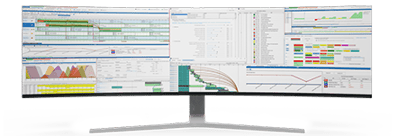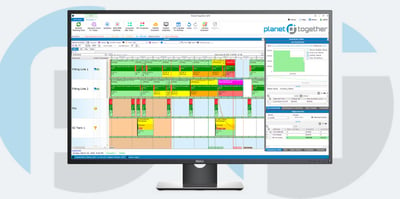Supply Chain Visibility and Control
In medical manufacturing, the need for supply chain visibility and control has never been more critical. Supply Chain Managers in these facilities face the daunting task of ensuring the availability of essential medical products while maintaining efficiency, cost-effectiveness, and compliance with regulatory requirements. To address these challenges, companies often rely on advanced planning and scheduling (APS) solutions like PlanetTogether, coupled with Enterprise Resource Planning (ERP), Supply Chain Management (SCM), and Manufacturing Execution Systems (MES).
In this blog, we will explore the vital role of supply chain visibility and control in medical manufacturing and the advantages of integrating PlanetTogether with ERP, SCM, and MES systems. We will look into the benefits, challenges, and best practices for achieving seamless integration, enabling Supply Chain Managers to optimize their operations effectively.

The Importance of Supply Chain Visibility and Control in Medical Manufacturing
Regulatory Compliance and Quality Assurance
One of the foremost concerns in medical manufacturing is regulatory compliance. The industry is highly regulated by authorities such as the Food and Drug Administration (FDA) and the European Medicines Agency (EMA). Ensuring that products meet stringent quality and safety standards is non-negotiable. Supply Chain Managers must have real-time visibility into every aspect of their supply chain to track and document the production and distribution of medical devices and pharmaceuticals.
Demand Variability and Forecasting
Medical manufacturing is highly susceptible to demand variability, influenced by factors like public health emergencies, seasonal fluctuations, and unexpected crises. Accurate demand forecasting is crucial for managing inventory levels and production schedules. A supply chain that can quickly adapt to changing demand patterns will reduce the risk of shortages or excess inventory.
Cost Optimization
Cost control is a paramount concern in medical manufacturing. Efficient supply chain operations directly impact the bottom line. Supply Chain Managers need to optimize resource utilization, minimize production downtime, and reduce waste. Real-time visibility allows for proactive decision-making, resulting in cost savings throughout the supply chain.
Inventory Management
Managing inventory levels is a delicate balance. Excessive inventory can tie up working capital, while insufficient inventory can lead to stockouts and disruptions. Supply Chain Managers need to monitor inventory levels across multiple locations, suppliers, and manufacturing facilities. This visibility helps in maintaining optimal stock levels, reducing carrying costs, and enhancing overall supply chain efficiency.
Production Scheduling and Resource Allocation
Optimal production scheduling is a core aspect of medical manufacturing. Manufacturing facilities must make the most of their resources, such as machines, labor, and materials. With real-time visibility and control, Supply Chain Managers can fine-tune production schedules to maximize output while ensuring that resources are utilized efficiently.


PlanetTogether: An Advanced Planning and Scheduling Solution
PlanetTogether is an industry-leading APS solution that empowers manufacturers with advanced tools for production planning, scheduling, and optimization. Its capabilities make it an excellent choice for medical manufacturing facilities aiming to improve their supply chain visibility and control.
Key features of PlanetTogether include:
Production Planning: PlanetTogether enables detailed production planning, considering factors like demand, capacity, lead times, and resource availability. It provides a visual representation of production schedules, helping planners make informed decisions.
Scenario Analysis: The software allows Supply Chain Managers to conduct "what-if" analyses, simulating different production scenarios to optimize schedules and resource allocation.
Real-Time Data Integration: PlanetTogether seamlessly integrates with various ERP, SCM, and MES systems, ensuring that planners have access to up-to-date data from across the supply chain.
Constraint-Based Scheduling: The software employs constraint-based scheduling algorithms to optimize production schedules while respecting capacity constraints, making it ideal for complex manufacturing environments.
Finite Capacity Scheduling: PlanetTogether considers finite capacity constraints, ensuring that production schedules are feasible and realistic.

Integrating PlanetTogether with ERP, SCM, and MES Systems
While PlanetTogether offers advanced planning and scheduling capabilities, its true potential is unlocked when integrated with ERP, SCM, and MES systems. Integration enables real-time data exchange, improving supply chain visibility and control. Here, we will explore the benefits and considerations of integrating PlanetTogether with popular systems such as SAP, Oracle, Microsoft, Kinaxis, Aveva, and others.
Benefits of Integration
Real-Time Data Sharing: Integration allows for seamless data sharing between PlanetTogether and other systems, ensuring that all stakeholders have access to the most up-to-date information. This enhances decision-making and reduces the risk of discrepancies.
End-to-End Visibility: Integrating APS with ERP, SCM, and MES systems provides end-to-end visibility of the supply chain, from order placement to production, and distribution. This visibility enables Supply Chain Managers to proactively address issues and make data-driven decisions.
Streamlined Processes: Integration streamlines processes by automating data transfer, reducing manual data entry, and eliminating the need for duplicate data storage. This not only saves time but also reduces the likelihood of errors.
Improved Forecasting: Real-time data from the integrated systems enhances demand forecasting accuracy, enabling Supply Chain Managers to respond more effectively to changes in demand.
Enhanced Resource Allocation: Integration allows for better resource allocation by aligning production schedules with resource availability, resulting in improved operational efficiency.
Considerations for Integration
While the advantages of integration are clear, Supply Chain Managers should be aware of certain considerations to ensure successful implementation:
Compatibility: Ensure that the chosen ERP, SCM, and MES systems are compatible with PlanetTogether and support seamless integration. Consult with your software providers to confirm compatibility and any additional requirements.
Data Mapping: Plan the data mapping process carefully. Define how data will be exchanged between systems, including the frequency and format of data transfers.
IT Infrastructure: Assess your organization's IT infrastructure to ensure it can support the integration effort. This may involve upgrading hardware, improving network capabilities, or adding additional resources as needed.
Data Security: Implement robust data security measures to protect sensitive information during data exchange. Encryption, access controls, and regular security audits are essential.
Change Management: Integration can lead to changes in processes and workflows. Provide adequate training and support to employees to ensure a smooth transition.
Best Practices for Integration
Define Clear Objectives: Clearly define your objectives for integrating PlanetTogether with ERP, SCM, and MES systems. Understand the specific benefits you aim to achieve, such as improved visibility, reduced lead times, or better resource allocation.
Involve Stakeholders: Engage key stakeholders, including IT teams, supply chain planners, and department heads, from the outset. Their input is invaluable for ensuring a successful integration project.
Develop a Comprehensive Plan: Create a detailed integration plan that includes timelines, milestones, and responsibilities. This plan should outline the scope of the integration, data mapping requirements, and testing procedures.
Test Thoroughly: Rigorously test the integration before deployment to identify and address any issues or inconsistencies. Conduct both functional and end-to-end testing to ensure data flows smoothly between systems.
Monitor and Evaluate: Once integration is complete, establish a monitoring and evaluation process to continuously assess the performance of the integrated systems. Regularly review key performance indicators (KPIs) to ensure that objectives are being met.
In the highly regulated and dynamic world of medical manufacturing, achieving supply chain visibility and control is essential. PlanetTogether, an advanced planning and scheduling solution, empowers Supply Chain Managers to optimize production schedules, allocate resources efficiently, and respond to changing demand patterns. However, its true potential is realized when PlanetTogether is integrated with ERP, SCM, and MES systems, providing end-to-end visibility and real-time data sharing.
By carefully planning and executing the integration process, Supply Chain Managers can harness the full power of PlanetTogether and other systems, leading to improved operational efficiency, enhanced decision-making, and better compliance with regulatory requirements.
Are you ready to take your manufacturing operations to the next level? Contact us today to learn more about how PlanetTogether and integrated scheduling solutions can help you achieve your sustainability goals and drive success in the medical industry.